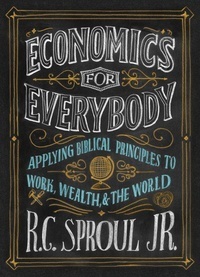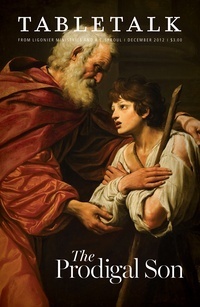R.C. Sproul's Blog, page 501
December 8, 2012
What's the Most Important Economic Lesson Americans Need to Learn?
There are any number of appropriate ways to answer this question. I have for years now affirmed that the most foundational economic truth is that God owns everything. We need to learn that, down to our toes. I have also affirmed that the first law of economics is that consuming more than we produce leads to poverty, consuming less than we produce leads to prosperity. Grasping these truths would go rather a long way in fixing what ails us, economically speaking.
Having barely survived another election season, however, and mourning the end of Twinkies, I'm tempted instead to start with this lesson- governments cannot create any wealth, though they can and usually do destroy wealth. On both sides of the aisle we had voters demanding and candidates promising more jobs, better health care, rising home values. Government, however, is a parasitic institution rather than a productive one. That is, the government doesn't actually produce anything. Everything that it has it first must take from someone else. If it "invests" in infrastructure, it does so with money taken from others who would invest where there was market demand. Federal loans (or guarantees which amount to the same thing) to green companies happen because people investing their own money don't think it a wise investment. Turns out people were right, the government wrong, again. The key point, however, is that they had to take money from you and me first.
Please remember this when the left complains of corporate greed supplanting human need. What these folks mean is, "I know better what to do with the wealth of stockholders than they know. I should have control over the wealth of others." Every dollar directed by the state is a dollar that once belonged to someone else, who would make market decisions, rather than political ones.
Which brings us to the other side of the coin. The state cannot create wealth, but they certainly can destroy it. The notion that businesses can just pass tax burdens on to consumers is patently false. Suppose for a moment that Michelle Obama successfully lobbies for a Twinkie Tax of $10 a Twinkie. How many Twinkies will Hostess be able to sell? Demand for a given product or service goes down when prices go up, even if prices go up because of an increased tax burden. Lowering demand is generally bad for business.
Governments also destroy wealth by inflating the money supply. This is a tax on savings. My $1 can buy a loaf of bread in an economy with x paper dollars. Double the number of paper dollars to 2x and dollars to donuts my dollar will now buy only half a loaf. The government, without taxing me, without breaking into the bank, has stolen half a loaf of bread from me. Inflation isn't businesses being greedy, but governments being devious and destructive.
 Finally governments can destroy wealth by regulating businesses. Requiring companies to provide health insurance to its employees, or pay them a wage above some arbitrary standard may seem like a good idea. Until we realize that wages are actually determined by supply and demand. If it costs me $10 an hour, because of government mandates, to hire someone for a job that I value at $9 an hour simply means no one gets hired to do the job. Multiply that principle across the board at a given business and it will go out of business.
Finally governments can destroy wealth by regulating businesses. Requiring companies to provide health insurance to its employees, or pay them a wage above some arbitrary standard may seem like a good idea. Until we realize that wages are actually determined by supply and demand. If it costs me $10 an hour, because of government mandates, to hire someone for a job that I value at $9 an hour simply means no one gets hired to do the job. Multiply that principle across the board at a given business and it will go out of business.
God gave the state the power of the sword, to punish evildoers. That's what they are to do. When they step outside their calling hardship comes, every time. Economies create wealth. Governments punish evildoers.
What's the Most Important Economic Lesson Americans Need to Learn? was originally published at RCSproulJr.com

December 7, 2012
5 Reasons I'm Excited to Teach at Reformation Bible College
The College. From my very first visit to the college I have been impressed with the vision and character of Reformation Bible College (RBC). I am very much looking forward to teaching in an environment where solid, biblical teaching is valued by both the faculty and the students. The school is not embarrassed to stand wholeheartedly with classic Protestant and Reformed teaching, which makes it quite unique in the world of bible colleges. For undergraduates there really is nothing like this out there—up to four years of intensive biblical, theological and philosophical study in the Reformed tradition.
The Students. Not to swell the size of their heads too much, but I am also very excited by the prospect of teaching the kinds of students that have been coming to RBC in its first two years. During my interview and a subsequent visit I had numerous conversations with students and was struck by how seriously they take studying the Bible from a robustly Reformed perspective, and how they were also eager for their study of theology to bring about spiritual transformation in their own lives. The chance to teach students who are passionate about God's word excites me greatly.
The Faculty. I have not even begun teaching at the college and yet can already see that the other professors at RBC are as excited as I am about teaching from the perspective of the classic confessions of Protestantism. This is not to say that there is absolute uniformity with regard to issues that fall outside the bounds of the Reformed confessions, but there is a joyful commitment to classic Reformed theology. This is a breath of fresh air in the theological atmosphere of our day, where classic confessions of faith are, more often than not, seen as a hindrance to vibrant piety and faithful Christian witness in the world. It is one thing merely to be willing to teach from within the confines of the Protestant confessions; it is another thing entirely to do so wholeheartedly, being convinced that these confessions faithfully convey the most essential teachings of the Bible.
The Curriculum. For a New Testament professor, the curriculum at RBC is a dream come true. I will be able to teach an entire class on Romans, one on Pauline theology, and one on New Testament biblical theology, just to mention three. I am very much looking forward to being able to prepare and develop these courses, and many others, over the years. It is a great privilege to be able to teach the courses I will be teaching at RBC.
The Location. Although, I prefer cold weather and snow, my wife loves warm weather and sunshine, so it will definitely be a nice change for her from the snow and cold of Southern Ontario. The campus of RBC is quite beautiful and will only add to the enjoyment of teaching with great students and colleagues. I also love thunderstorms, and have already seen some amazing ones in my two trips to the college. I suppose I could also get used to the beaches.
Dr. Ben C. Dunson is the new director of admissions and professor of New Testament at Reformation Bible College.

Worthy Eating and Drinking
Here's an excerpt from Worthy Eating and Drinking, Iain Campbell's contribution to the December issue of Tabletalk.
One of our Scottish preachers used to say that the believer has three looks at the Lord's Table. There is, first, a retrospective look. The sacrament of the Lord's Supper is a commemoration, a celebration of an event in the past. It is an aid to us in remembering the pivotal, redemptive point of history, the point at which the Son of God died for his people. It is not a re-enactment of the sacrifice, but it is a dramatic visual aid to faith as it looks back over history to the point at which the sacrificial lamb died for us.
Second, there is a prospective look in the sacrament. It looks forward as surely as it looks back. It anticipates the return of the Lord. It belongs to the design of the Lord's Supper that it is a temporary arrangement "till he comes." The bride of Christ does not remember the death of her bridegroom as a widow but as one who longs for the day when the bridegroom will return to take her home.
But, third, there must be an introspective look in the sacrament. We are called to look inward as we participate, to prepare for the Lord's Table by examining ourselves. We are not called to be self-obsessed, but we are called to be self-aware, to bring ourselves under the scrutiny of God's Word even as God's Word invites us to come to the feast.
Continue reading Worthy Eating and Drinking online or learn more about the digital edition of Tabletalk.

$5 Friday: Roman Catholicism, Theology, & Christmas

It's time for our weekly $5 Friday sale. This week's resources cover such topics as Roman Catholicism, preaching, theology, John's Gospel, predestination, the Puritans, Christmas music, and much more. Thanks to Desiring God for parterning with us this week.
Sale runs through 12:01 a.m. — 11:59 p.m. Friday EST.
View today's $5 Friday sale items.

Is Christmas a Pagan Holiday?

That question comes up every year at Christmastime. In the first place, there's no direct biblical commandment to celebrate the birth of Jesus on December 25. There's nothing in the Bible that would even indicate that Jesus was born on December 25. In fact, there's much in the New Testament narratives that would indicate that it didn't occur during that time of year. It just so happens that on the twenty-fifth of December in the Roman Empire there was a pagan holiday that was linked to mystery religions; the pagans celebrated their festival on December 25. The Christians didn't want to participate in that, and so they said, "While everybody else is celebrating this pagan thing, we're going to have our own celebration. We're going to celebrate the thing that's most important in our lives, the incarnation of God, the birth of Jesus Christ. So this is going to be a time of joyous festivities, of celebration and worship of our God and King."
I can't think of anything more pleasing to Christ than the church celebrating his birthday every year.—R.C. Sproul
I can't think of anything more pleasing to Christ than the church celebrating his birthday every year. Keep in mind that the whole principle of annual festival and celebration is deeply rooted in ancient Jewish tradition. In the Old Testament, for example, there were times when God emphatically commanded the people to remember certain events with annual celebrations. While the New Testament doesn't require that we celebrate Christmas every year, I certainly see nothing wrong with the church's entering into this joyous time of celebrating the Incarnation, which is the dividing point of all human history. Originally, it was intended to honor, not Mithras or any of the other mystery religion cults, but the birth of our King.
Incidentally, Easter can be traced to Ishtar in the ancient world. But the Christian church coming together to celebrate the resurrection of Jesus is hardly something I think would provoke the wrath of God. I wish we had more annual festivals. The Roman Catholic Church, for example, celebrates with great joy the Feast of the Ascension every year. Some Protestant bodies do, but most do not. I wish we would celebrate that great event in the life of Christ when he was raised up into heaven to be crowned King of kings and Lord of lords. We celebrate his birth; we celebrate his death. I wish we would also celebrate his coronation.
Adapted from Now, That’s a Good Question! ©1996 by R.C. Sproul. Used by permission of Tyndale.

Our New Resource Guide is Now Available in Print and iPad Editions
Our new 2012-2013 Resource Guide is now available with a collection of handpicked resources to help equip you for kingdom service.
View our resource guide online or download the newly released iPad app.
This 67-page resource guide also features a selection of Christmas gift ideas by offering the following:
Gift suggestions under $15
Gift suggestions under $25
Gifts ideas for children & youth
Our most popular and bestselling resources
Suggested resources from our Teaching Fellows, and more
Important Dates
For delivery by Christmas please remember the following dates:
December 13: Order by this date for UPS Ground Shipping.
December 18: Must order by phone and choose 2nd-Day Air or Overnight shipping.
If you prefer a free print copy of our resource guide please request one by emailing service@ligonier.org or calling 800-435-4343.

December 5, 2012
Google Hangout with Steven Lawson

Ligonier Ministries strives, with your support, to leverage new media technology for the advancement of God's Kingdom. One way we hope to achieve this is through providing opportunities for you to connect with, and learn from, trustworthy Bible teachers.
 We invite you to join us today (12/5) at 3:00 p.m. EST to watch live as we "Hangout" with Ligonier teaching fellow, board member, and Reformation Trust author, Dr. Steven J. Lawson, to discuss life, ministry, and his soon to be released book, The Heroic Boldness of Martin Luther.
We invite you to join us today (12/5) at 3:00 p.m. EST to watch live as we "Hangout" with Ligonier teaching fellow, board member, and Reformation Trust author, Dr. Steven J. Lawson, to discuss life, ministry, and his soon to be released book, The Heroic Boldness of Martin Luther.
Shortly before 3:00 p.m. EST today (12/5), this blog post will be updated to allow you to watch this live Google Hangout direct from the blog. Alternatively, you can "circle" us on Google+ and watch there or watch via the Ligonier YouTube channel.
See you here at 3:00 p.m. EST.

TULIP and Reformed Theology: Perseverance of the Saints

Writing to the Philippians, Paul says, "He who has begun a good work in you will perfect it to the end" (Phil. 1:6). Therein is the promise of God that what He starts in our souls, He intends to finish. So the old axiom in Reformed theology about the perseverance of the saints is this: If you have it—that is, if you have genuine faith and are in a state of saving grace—you will never lose it. If you lose it, you never had it.
We know that many people make professions of faith, then turn away and repudiate or recant those professions. The Apostle John notes that there were those who left the company of the disciples, and he says of them, "Those who went out from us were never really with us" (1 John 2:19). Of course, they were with the disciples in terms of outward appearances before they departed. They had made an outward profession of faith, and Jesus makes it clear that it is possible for a person to do this even when he doesn't possess what he's professing. Jesus says, "This people honors Me with their lips, but their heart is far from Me" (Matt. 15:8). Jesus even warns at the end of the Sermon on the Mount that at the last day, many will come to Him, saying: "Lord, Lord, didn't we do this in your name? Didn't we do that in your name?" He will send them away, saying: "Depart from Me, you workers of iniquity. I never knew you" (Matthew 7:23). He will not say: "I knew you for a season and then you went sour and betrayed Me. No, you never were part of My invisible church." The whole purpose of God's election is to bring His people safely to heaven; therefore, what He starts He promises to finish. He not only initiates the Christian life, but the Holy Spirit is with us as the sanctifier, the convictor, and the helper to ensure our preservation.
True Christians can have radical and serious falls but never total and final falls from grace. —R.C. Sproul
I want to stress that this endurance in the faith does not rest on our strength. Even after we're regenerated, we still lapse into sin, even serious sin. We say that it is possible for a Christian to experience a very serious fall, we talk about backsliding, we talk about moral lapses, and so on. I can't think of any sin, other than blasphemy against the Holy Spirit, that a truly converted Christian is not capable of committing.
We look, for example, at the model of David in the Old Testament. David was surely a man after God's own heart. He was certainly a regenerate man. He had the Spirit of God in Him. He had a profound and passionate love for the things of God. Yet this man not only committed adultery but also was involved in a conspiracy to have his lover's husband killed in war—which was really conspiracy to murder. That's serious business. Even though we see the serious level of repentance to which David was brought as a result of the words of the prophet Nathan to him, the point is that David fell, and he fell seriously.
The apostle Paul warns us against having a puffed-up view of our own spiritual strength. He says, "Therefore let anyone who thinks that he stands take heed lest he fall" (1 Cor. 10:12). We do fall into very serious activities. The Apostle Peter, even after being forewarned, rejected Christ, swearing that he never knew Him—a public betrayal of Jesus. He committed treason against His Lord. When he was being warned of this eventuality, Peter said it would never happen. Jesus said, "Simon, Simon, Satan would have you and sift you like wheat, but I have prayed for you, so that when you turn, strengthen the brothers" (Luke 22:31).Peter fell, but he returned. He was restored. His fall was for a season. That's why we say that true Christians can have radical and serious falls but never total and final falls from grace.
I think this little catchphrase, perseverance of the saints, is dangerously misleading. It suggests that the perseverance is something that we do, perhaps in and of ourselves. I believe that saints do persevere in faith, and that those who have been effectually called by God and have been reborn by the power of the Holy Spirit endure to the end. However, they persevere not because they are so diligent in making use of the mercies of God. The only reason we can give why any of us continue on in the faith is because we have been preserved. So I prefer the term the preservation of the saints, because the process by which we are kept in a state of grace is something that is accomplished by God. My confidence in my preservation is not in my ability to persevere. My confidence rests in the power of Christ to sustain me with His grace and by the power of His intercession. He is going to bring us safely home.
See also:
TULIP and Reformed Theology: An Introduction
TULIP and Reformed Theology: Total Depravity
TULIP and Reformed Theology: Unconditional Election
TULIP and Reformed Theology: Limited Atonement
TULIP and Reformed Theology: Irresistible Grace
TULIP and Reformed Theology: Perseverance of the Saints
Scriptures for further study: Matthew 24:13; Romans 8:31–36; 2 Corinthians 4:7–16; Hebrews 6:9–12; 10:35–39

December 4, 2012
Columns from Tabletalk Magazine, December 2012
 The December edition of Tabletalk is out. This issue features articles examining the parable of the prodigal son. A rich and complex parable, the prodigal son addresses the elements of sin, forgiveness, love, and much more. While Jesus addressed the context in which He lived through this parable and the others recorded in Luke 15, its meaning and importance transcend His generation and apply to us today. The articles addressing the main characters of the narrative should treat each character as a sermon, demonstrating the theology of each individual chracter and how each one informs our Christian life.
The December edition of Tabletalk is out. This issue features articles examining the parable of the prodigal son. A rich and complex parable, the prodigal son addresses the elements of sin, forgiveness, love, and much more. While Jesus addressed the context in which He lived through this parable and the others recorded in Luke 15, its meaning and importance transcend His generation and apply to us today. The articles addressing the main characters of the narrative should treat each character as a sermon, demonstrating the theology of each individual chracter and how each one informs our Christian life.
Contributors include R.C. Sproul along with Thomas Schreiner, David Murray, John Sartelle, Allan Murray, Scotty Smith, R.C. Sproul Jr., Iain Campbell, David Mathis, Brian Tallman and T.D. Alexander.
We do not post all of the feature articles or the daily devotionals from the issue, so you'll have to subscribe to get those. But for now, here are links to several free columns and articles from this month:
Sight, Place, and the Presence of God by R.C. Sproul
Hope for Prodigal Children by Burk Parsons
The Prodigal God by R.C. Sproul Jr.
Swimming the Tiber? by Mark Jones
Bringing Marriage Back to Earth by Brian Tallman
The Prodigal Son(s) and Church Discipline by Scotty Smith
From Eden to the New Jerusalem: An Interview with T.D. Alexander
Worthy Eating and Drinking by Iain Campbell
If you have not yet subscribed to Tabletalk, now is the perfect time. Your print subscription also gives you free access to the digital edition of Tabletalk. For those living in the U.S. and Canada it's only $23 for a year, and $20 to renew. You save even more if you get a 2- or 3-year subscription (as little as $1.36 per issue). We offer special discounts for churches or businesses who want multiple copies of each issue.
Get your subscription to Tabletalk today by calling one of Ligonier Ministries' resource consultants at 800-435-4343 or by subscribing online. You can also get free shipping on individual 2012 issues of Tabletalk.

December 3, 2012
The Soul of the Solas
Here's an excerpt from The Soul of the Solas, R.C. Sproul Jr.'s contribution to the November issue of Tabletalk.
It puzzles me deeply that so few are puzzled deeply by the paradox. We are so used to the befuddling language that we miss its befuddling nature. It ought to stop us in our tracks and arrest our attention, like those signs I see for Fifth Third Bank. Fifth Bank I could understand. Third Bank I could understand. I could understand them merging to become Fourth Bank. But Fifth Third Bank? What does that even mean?
In like manner, how is it that when our spiritual ancestors, our theological heroes, set out to tell us one thing, they ended up telling us five things? Suppose I had lived in a cave for the last five hundred years and then met someone who wanted to get me up to speed on the Reformation and what I should believe. What if they said: "There are five things. The first one is sola…"? Would I not have to say: "Stop right there. If there are five, how can even one of them be called sola?"
Continue reading the eight reasons in The Soul of the Solas online or get the Tabletalk app and read it on your iPad for free.

R.C. Sproul's Blog
- R.C. Sproul's profile
- 1933 followers




